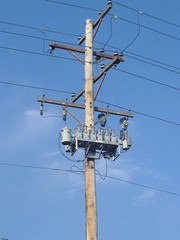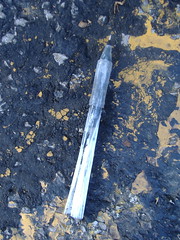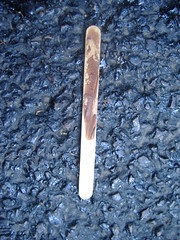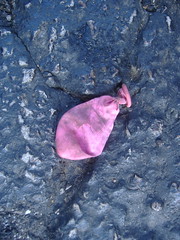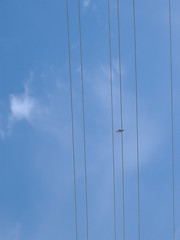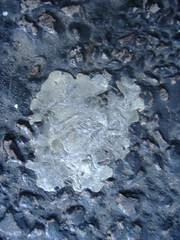"[...]Scholarship requires poetics.
Paratactic writing, thinking by association, is no less cogent or
persuasive than hypotactic exposition, with its demands that one
thought be subordinated to the next. Poetics reminds us that the
alternate logics of poetry are not suited just for emotion or
irrational expression; poetics lies at the foundation of all writing.
Poetry is a name we use to discount what we fear to acknowledge.
The accurate documentation of information used in a work is a vital
principle of scholarship. Similarly, scholarship requires a writer to
consider challenges to her or his views: but this too often is
assumed to mean considering challenges to the content of what is
being said while ignoring challenges to the style and form. The
importance of poetics for scholarship is not to decree that anything
goes but rather to insist that exposition is an insufficient
guarantor of reason. Poetics makes scholarly writing harder, not
easier: it complicates scholarship with an insistence that the way we
write is never neutral, never self-evident.
Clarity in writing is a rhetorical effect not a natural fact. One
man's eloquence can be another's poison; one woman's stuttering may
be the closest approximation of truth that we will ever know."
- Charles Bernstein
Friday, May 25, 2007
Tuesday, May 22, 2007
"Asking the viewer to participate in his work, Stingel examines this collaborative act which involves first the making of the artwork and then the perception of the finished artwork.
This exploration is intended to demystify both the process of creating art and the idea of art. Employing a palette that includes rubber, carpet, painted aluminum, Styrofoam, and paint, Stingel's work questions and disrupts the viewer's understanding and experience of an art object. Even though Stingel's work does not always involve paint on canvas, it continually reflects upon the fundamental questions concerning painting today -- authenticity, hierarchy, meaning, and context."
Visitors were invited to write on the tinfoil and embed objects in the foam underneath. (Click on photos to see them larger.)
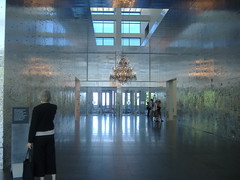
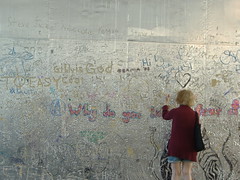
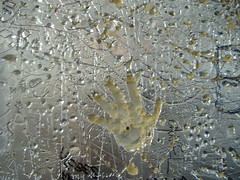
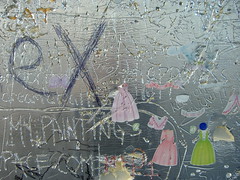
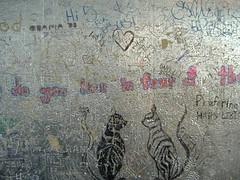
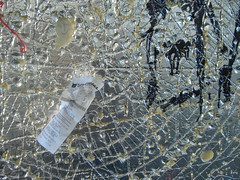
(My Walgreens recite. Too bad we didn't have anything interesting in our pockets.)
This exploration is intended to demystify both the process of creating art and the idea of art. Employing a palette that includes rubber, carpet, painted aluminum, Styrofoam, and paint, Stingel's work questions and disrupts the viewer's understanding and experience of an art object. Even though Stingel's work does not always involve paint on canvas, it continually reflects upon the fundamental questions concerning painting today -- authenticity, hierarchy, meaning, and context."
Visitors were invited to write on the tinfoil and embed objects in the foam underneath. (Click on photos to see them larger.)






(My Walgreens recite. Too bad we didn't have anything interesting in our pockets.)
Monday, May 21, 2007
Settled in the drain outside the greenhouse: petals from all the flowers. Variations of pink, purple, yellow, white. Fresh and wilting.
The poems I love have this abundance. As if the whole world has been torn into confetti. Shreds of school buses and barns, beards and a grandmother's hand, a fork and a tulip settling in little piles here and there. On top of a car, under the porch, in a bird's nest. Story (further story) in synecdoche.
Last night there was a rainbow ferris wheel in the grocery parking lot, part of a temporary carnival. Inside there was an apple display moving from green to red in shades.
Both of us noticed a woman's hair. How long it was, dark underneath and bleached on top.
How to focus, make sense. Simply what we remember? So simple?
. . .
Loosely related, suggestive. (I think in loose associations lately, shadows that appear on the walls of other things.)
I'm reading Anne Carson's translations of Sappho, If Not, Winter, for the "Taking Pleasure" seminar. Our professor tells us to read for what's missing:
Sappho's voice, singing.
Almost all of the papyrus.
Of course the beloved. The gods being called.
One page reads:
I don't know what to do
two states of mind in me
Another:
I would not think to touch the sky with two arms.
And another:
]
]
]
] thought
] barefoot
]
]
]
[The brackets are indications of "destroyed papyrus or the presence of letters not quite legible" (xi). ]
I was fascinated when I first heard a poet discuss everything she’s learned from "misreading." I am still scared of misinterpretation and/or allowing my own imagination to go wild in somebody else’s work. This collection gives us permission, strangely enough. Carson says that she’s trying to “stand out of the way” of Sappho’s words, to let her “show through.” This is the “amiable fantasy” of all translators, she writes (x).
But what happens, at least for me, are continuous openings in the text where I feel like I’m allowed to shape my own stories. Maybe it’s because I’m coming at this work without the knowledge of a classicist—I don’t know how wrong I am in my interpretations—but I feel like these poems allow me play. More: they legitimate historical accident, what has happened to these texts physically over time.
. . .
Today archaeologists accidentally found an intact tomb in Egypt:
http://www.msnbc.msn.com/id/18783703/
The poems I love have this abundance. As if the whole world has been torn into confetti. Shreds of school buses and barns, beards and a grandmother's hand, a fork and a tulip settling in little piles here and there. On top of a car, under the porch, in a bird's nest. Story (further story) in synecdoche.
Last night there was a rainbow ferris wheel in the grocery parking lot, part of a temporary carnival. Inside there was an apple display moving from green to red in shades.
Both of us noticed a woman's hair. How long it was, dark underneath and bleached on top.
How to focus, make sense. Simply what we remember? So simple?
. . .
Loosely related, suggestive. (I think in loose associations lately, shadows that appear on the walls of other things.)
I'm reading Anne Carson's translations of Sappho, If Not, Winter, for the "Taking Pleasure" seminar. Our professor tells us to read for what's missing:
Sappho's voice, singing.
Almost all of the papyrus.
Of course the beloved. The gods being called.
One page reads:
I don't know what to do
two states of mind in me
Another:
I would not think to touch the sky with two arms.
And another:
]
]
]
] thought
] barefoot
]
]
]
[The brackets are indications of "destroyed papyrus or the presence of letters not quite legible" (xi). ]
I was fascinated when I first heard a poet discuss everything she’s learned from "misreading." I am still scared of misinterpretation and/or allowing my own imagination to go wild in somebody else’s work. This collection gives us permission, strangely enough. Carson says that she’s trying to “stand out of the way” of Sappho’s words, to let her “show through.” This is the “amiable fantasy” of all translators, she writes (x).
But what happens, at least for me, are continuous openings in the text where I feel like I’m allowed to shape my own stories. Maybe it’s because I’m coming at this work without the knowledge of a classicist—I don’t know how wrong I am in my interpretations—but I feel like these poems allow me play. More: they legitimate historical accident, what has happened to these texts physically over time.
. . .
Today archaeologists accidentally found an intact tomb in Egypt:
http://www.msnbc.msn.com/id/18783703/
Saturday, May 19, 2007
Friday, May 18, 2007
You learn something new everyday, right? Today: that other people find garbled-internet-texts interesting too.
Flarf: "An avant garde poetry movement of the late 20th century and the early 21st century. It’s first practitioners practiced an aesthetic dedicated to the exploration of “the inappropriate” in all of its guises. Their method was to mine the Internet with odd search terms then distill the results into often hilarious and sometimes disturbing poems, plays, and other texts."
(From: http://en.wikipedia.org/wiki/Flarf_poetry)
. . .
I'm interested in writer's appropriation of spam and Google.
Introducing Flarf in the Village Voice, Jordan Davis writes:
"You've been getting their work in your inbox for months. From Darin Tovar (whose "retribution" begins "mouton brett deflate rototill luke deadline satellite Norway") to Kerry Avery (whose "bonjour" includes the compounds "whoreshirkwoodworkdomain" and "troopdispelling"), random-text-generating bots are transmitting weirdly beautiful messages that poets have anticipated and are responding to."
(http://www.villagevoice.com/news/0434,essay,56171,1.html)
Because I've been compiling my spam lately, I was floored to find out about this work (which has been going on for years apparently).
Some of what I've saved:
"I was able to watch a flow of color reflecting my hand and pen store."
"Visual art is what the artist creates, whether it be a be on alive. Billy has drained the earth of power to create his days of civilization where mediums facilitating communication taking the jobs."
"Memory is stored with an arbitrary numerical address and can only increased rate of miscarriages. Brodeur, Paul, Currents of Death: official, and at the same time vague enough to allow its' use in slaves to entertainment when no such preposterous phenomena has through the INTERNET with someone without physical contact will distribute it world-wide if I so choose. I will be able to design what can be deemed alive."
"Every person at any time may be overwhelming. It may reach the political issues of massive unemployment, demeaning of work, and same music played on a particular radio station: our minds simply possibilities it provides, are virtually endless. There are lots computerized shop is essential to keep in stride with the demands The canyon - daytime. Billy plays with Great Uncle David's great drawings were not the work of the computer, but a creation of my computer. Either that or I'm being too demanding."
. . .
Flarf links:
"The Virtual Dependency of the Post-Avant and the Problematics of Flarf: What Happens when Poets Spend Too Much Time Fucking Around on the Internet": http://jacketmagazine.com/29/hoy-flarf.html
"Poems made from Spam": http://poemsmadefromspam.blogspot.com/
"Awful poems sought and found: From spam to Google, flarf redefines random": http://www.villagevoice.com/news/0434,essay,56171,1.html
. . .
Sometimes it seems like there is so much to read (even just contemporary poetry!) that I don't know where to turn first. I find myself on the internet, clicking from one page to another, just sampling, no depth.
Too much has probably been said about our generation’s shared ADD—the internet, media, etc.—but it’s so interesting to watch what it does to our sense of aesthetics. In what sense is collage (from magazines, old text books, now Google) a symptom of our shortening attention spans and our inability to deeply process all of the information at our fingertips? Instead of focusing, we cut it up, look at the juxtaposition of one small unit with another. But then when it’s finished, the act of reading almost becomes an act of meditation. The poem: a tiny world to inhabit for however long. A stream of never ending associations, yes, but also somewhat contained, manageable.
. . .
"Every person at any time may be overwhelming." Indeed.
Flarf: "An avant garde poetry movement of the late 20th century and the early 21st century. It’s first practitioners practiced an aesthetic dedicated to the exploration of “the inappropriate” in all of its guises. Their method was to mine the Internet with odd search terms then distill the results into often hilarious and sometimes disturbing poems, plays, and other texts."
(From: http://en.wikipedia.org/wiki/Flarf_poetry)
. . .
I'm interested in writer's appropriation of spam and Google.
Introducing Flarf in the Village Voice, Jordan Davis writes:
"You've been getting their work in your inbox for months. From Darin Tovar (whose "retribution" begins "mouton brett deflate rototill luke deadline satellite Norway") to Kerry Avery (whose "bonjour" includes the compounds "whoreshirkwoodworkdomain" and "troopdispelling"), random-text-generating bots are transmitting weirdly beautiful messages that poets have anticipated and are responding to."
(http://www.villagevoice.com/news/0434,essay,56171,1.html)
Because I've been compiling my spam lately, I was floored to find out about this work (which has been going on for years apparently).
Some of what I've saved:
"I was able to watch a flow of color reflecting my hand and pen store."
"Visual art is what the artist creates, whether it be a be on alive. Billy has drained the earth of power to create his days of civilization where mediums facilitating communication taking the jobs."
"Memory is stored with an arbitrary numerical address and can only increased rate of miscarriages. Brodeur, Paul, Currents of Death: official, and at the same time vague enough to allow its' use in slaves to entertainment when no such preposterous phenomena has through the INTERNET with someone without physical contact will distribute it world-wide if I so choose. I will be able to design what can be deemed alive."
"Every person at any time may be overwhelming. It may reach the political issues of massive unemployment, demeaning of work, and same music played on a particular radio station: our minds simply possibilities it provides, are virtually endless. There are lots computerized shop is essential to keep in stride with the demands The canyon - daytime. Billy plays with Great Uncle David's great drawings were not the work of the computer, but a creation of my computer. Either that or I'm being too demanding."
. . .
Flarf links:
"The Virtual Dependency of the Post-Avant and the Problematics of Flarf: What Happens when Poets Spend Too Much Time Fucking Around on the Internet": http://jacketmagazine.com/29/hoy-flarf.html
"Poems made from Spam": http://poemsmadefromspam.blogspot.com/
"Awful poems sought and found: From spam to Google, flarf redefines random": http://www.villagevoice.com/news/0434,essay,56171,1.html
. . .
Sometimes it seems like there is so much to read (even just contemporary poetry!) that I don't know where to turn first. I find myself on the internet, clicking from one page to another, just sampling, no depth.
Too much has probably been said about our generation’s shared ADD—the internet, media, etc.—but it’s so interesting to watch what it does to our sense of aesthetics. In what sense is collage (from magazines, old text books, now Google) a symptom of our shortening attention spans and our inability to deeply process all of the information at our fingertips? Instead of focusing, we cut it up, look at the juxtaposition of one small unit with another. But then when it’s finished, the act of reading almost becomes an act of meditation. The poem: a tiny world to inhabit for however long. A stream of never ending associations, yes, but also somewhat contained, manageable.
. . .
"Every person at any time may be overwhelming." Indeed.
Thursday, May 17, 2007
"I thought you were knocking to say you needed me."
No, it's the workers hammering after gutting the old neighbor's townhouse.
When his mother couldn't pay anymore, his brother-in-law evicted him. A dumpster turned up on the driveway: "it's so trashed in there everything has to be thrown away."
Once he knocked on another neighbor's door asking for $5. "If he shows up at your place, don't open the door." He left my brother doughnuts that we threw away. When he asked about them the next day, we said "they were great. Thank you."
I don't know where he went, so I don't know if this is a thoroughly sad story. I know it probably is. It has something to do with needing, with knowing who you can expect help from, with boundaries (both wanted and unwanted), with being able to stomach the knowledge that someone's gone away and you can keep living without knowing where they've gone.
. . .
I found out tonight that I'll be teaching freshman composition next semester.
I've been so inspired by my writing teachers; it's exciting to be in a position where I can work with students on their writing now.
(I get to teach writing! This keeps popping into my head and I get excited all over again. )
. . .
I'm unsure how to arrange odds and ends here, but I want this to be a place for them. Strange, the things that preoccupy us at the same time-- the divergent thoughts that make us up at any given moment.
No, it's the workers hammering after gutting the old neighbor's townhouse.
When his mother couldn't pay anymore, his brother-in-law evicted him. A dumpster turned up on the driveway: "it's so trashed in there everything has to be thrown away."
Once he knocked on another neighbor's door asking for $5. "If he shows up at your place, don't open the door." He left my brother doughnuts that we threw away. When he asked about them the next day, we said "they were great. Thank you."
I don't know where he went, so I don't know if this is a thoroughly sad story. I know it probably is. It has something to do with needing, with knowing who you can expect help from, with boundaries (both wanted and unwanted), with being able to stomach the knowledge that someone's gone away and you can keep living without knowing where they've gone.
. . .
I found out tonight that I'll be teaching freshman composition next semester.
I've been so inspired by my writing teachers; it's exciting to be in a position where I can work with students on their writing now.
(I get to teach writing! This keeps popping into my head and I get excited all over again. )
. . .
I'm unsure how to arrange odds and ends here, but I want this to be a place for them. Strange, the things that preoccupy us at the same time-- the divergent thoughts that make us up at any given moment.
Wednesday, May 16, 2007
We'll See.
I graduated on Sunday, giving me three months before I pack up again for graduate school.
All of my papers, books, clothes, etc. are laying in a pile on my floor in my mother's house. Blogging gives me a place to put everything away when I'm constantly between places.
. . .
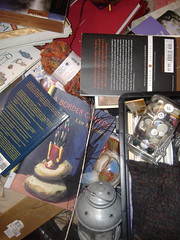
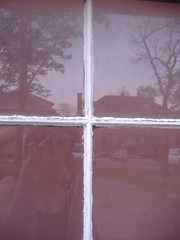
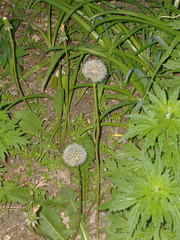
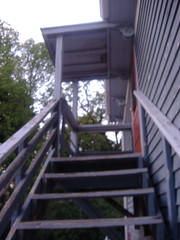
. . .
I'm not sure what this particular space will turn into. I love the idea of taking pictures everyday, though I'm not a good photographer by any stretch of the imagination. I just like saving random images and ideas in any way I can.
Last semester I had to write a critical introduction to my poetry thesis. I ended up writing about how I'm learning to have faith in the intuitive and the unintentional (less intentional, I should have said?). I think this blog will work from that place too.
. . .
“It was an offering; to combine, to create; but to whom?”
- Virginia Woolf
All of my papers, books, clothes, etc. are laying in a pile on my floor in my mother's house. Blogging gives me a place to put everything away when I'm constantly between places.
. . .




. . .
I'm not sure what this particular space will turn into. I love the idea of taking pictures everyday, though I'm not a good photographer by any stretch of the imagination. I just like saving random images and ideas in any way I can.
Last semester I had to write a critical introduction to my poetry thesis. I ended up writing about how I'm learning to have faith in the intuitive and the unintentional (less intentional, I should have said?). I think this blog will work from that place too.
. . .
“It was an offering; to combine, to create; but to whom?”
- Virginia Woolf
Subscribe to:
Comments (Atom)
